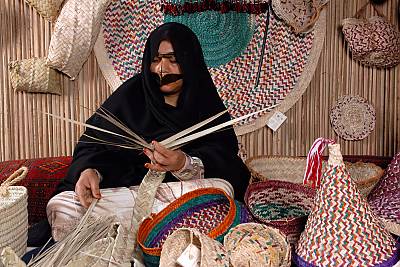The living practice of heritage in any society is based on two basic pillars that contribute to its preservation and transmission from generation to generation, namely:
The broad participation of individuals, groups, and communities in this heritage, and the sustainability and continuity of its practice by adapting to crises and new circumstances in creative new ways.
While under normal circumstances the responsibility for sustaining the practice of heritage is both a societal and governmental responsibility, this responsibility takes on a newfound urgency and requires more work and commitment during troubled and unusual times.
In such times, maintaining and promoting a living heritage requires more effort, attention, and creativity.
There is no doubt that the Coronavirus (COVID-19) epidemic that swept across the world has hindered many of the usual activities and opportunities for societies to practice their heritage. At the same time, it prompted the adoption of innovative ideas, plans, and programs to maintain cultural and heritage practices without any interruption.
Under the circumstances imposed by the epidemic, it has become necessary to adapt to this new reality. This means maintaining various programs and plans in ways that do not conflict with the safety control and preventative measures adopted by the United Arab Emirates to confront the epidemic.
The experience of the Department of Culture and Tourism - Abu Dhabi in preserving living heritage in light of the Coronavirus epidemic is as follows:
In adherence with measures put in place to combat the epidemic, especially with regards to social distancing, efforts are being made to promote and maintain the practice of heritage using remote digital communication technologies and providing the means to ensure its practice while avoiding gatherings and group activities.
These new measures include:
- Artisans and practicing families can carry out their traditional handicraft work at home instead of the usual work groups at handicraft centres in Abu Dhabi and Al Ain.
- Promoting the artisans’ crafts and traditional products such as Sadu, decorative weaving (Talli), palm wicker (Khoos), camel gear, traditional decorative items, traditional clothing, and traditional herbs using digital communication media.
- Introducing certain traditional crafts and industries using audio clips that are broadcast on social media. One example is audio representations of palm tree farming including planting, pruning, raking, and splicing of palm trees.
- Broadcasting cultural and heritage entertainment programmes on the Department’s website, including traditional music concerts presented by Bait Al Oud Abu Dhabi.
Ideas and proposals:
- Presenting a varied weekly heritage competition under the title ‘Stay at Home and know your Heritage’ which includes puzzles, performances, heritage and cultural sites, etc.
- Creating a website to sell traditional crafts produced by male and female artisans and practicing families such as coffee, spice, dates, sweets, khoos and talli products, using contracted courier companies to deliver products to buyers’ homes.
- Introducing heritage and cultural sites through the virtual website.
- Using video conferencing to hold the ‘Majlis Al Rowat’ chat show which discusses various cultural and heritage topics with facilities for the public to participate remotely.
Las designaciones utilizadas y la presentación de los textos y documentos presentados en esta plataforma no suponen ninguna toma de posición por parte de la UNESCO acerca de la condición jurídica de los países, territorios, ciudades o zonas ni respecto al trazado de sus fronteras o límites.
